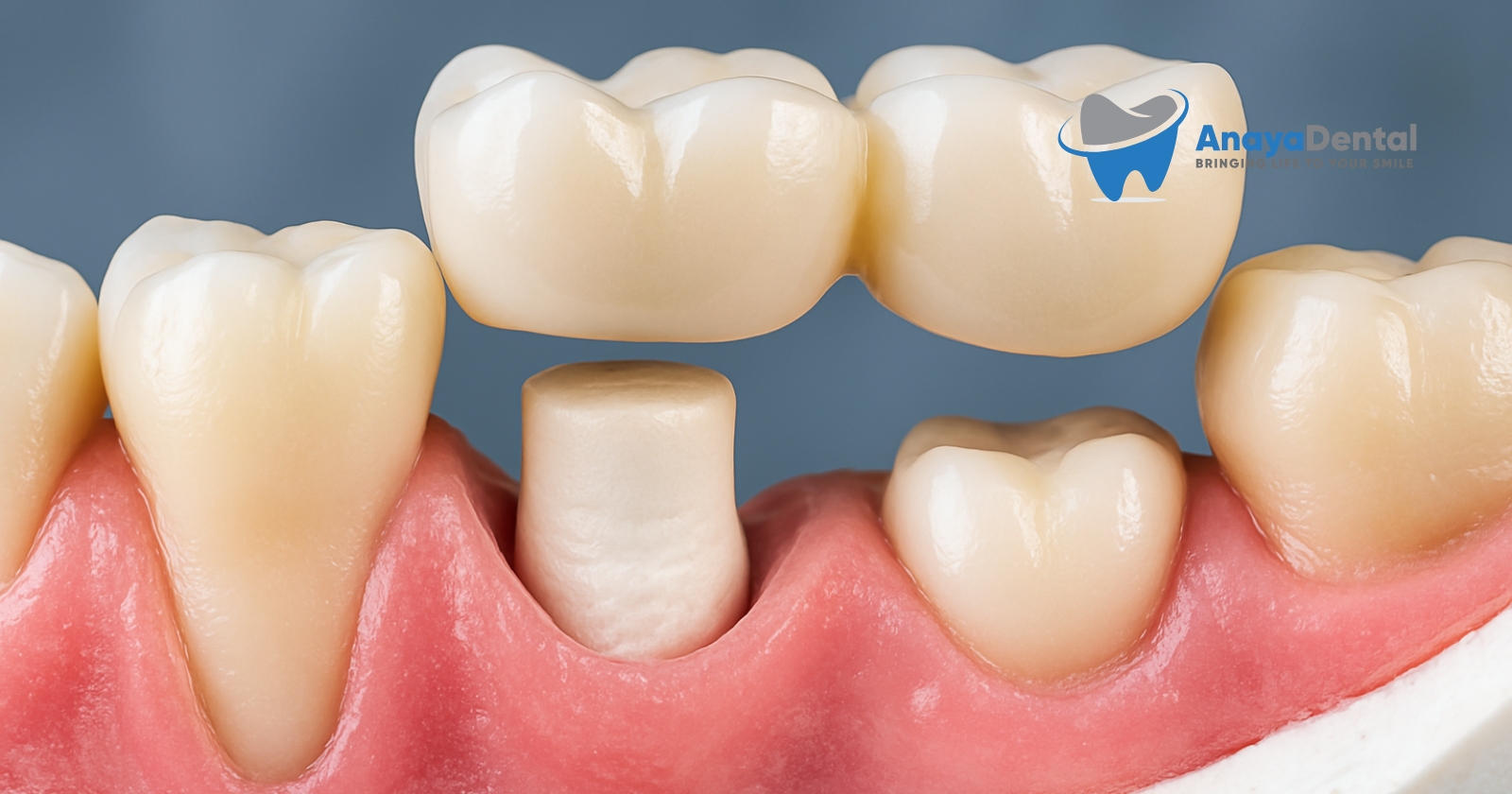What Is the D2751 Dental Code?
The D2751 dental code designates a crown restoration made from porcelain fused to base metal. This specific procedure code is used when your dentist places a crown that combines the aesthetic qualities of porcelain with the strength and durability of metal. The crown fully covers a damaged tooth from the gum line up, restoring both function and appearance.
When you receive treatment documentation or insurance statements, you’ll see this code listed as: D2751 – crown – porcelain fused to predominantly base metal.
When Your Dentist Recommends a D2751 Crown
Your dentist might recommend a porcelain-fused-to-metal (PFM) crown in several situations:
Try Our Dental Calculators
- When you have a severely decayed tooth that can’t be restored with a filling
- After root canal therapy to protect and strengthen the treated tooth
- For teeth with large fractures or cracks that compromise structural integrity
- To replace an existing crown that has failed or worn out
- As part of a dental bridge to replace missing teeth
- For cosmetic improvement of misshapen or discolored teeth
D2751 crowns are particularly recommended for molars and premolars where both strength and appearance matter. These crowns can withstand powerful biting forces while maintaining a natural look.
The D2751 Crown Procedure: What to Expect
Initial Examination and Preparation
- Your dentist will thoroughly examine your tooth and take dental X-rays to assess the extent of damage and determine if a crown is necessary.
- The tooth will be numbed with local anesthesia to ensure your comfort.
- The dentist will reshape your tooth, removing a portion of the outer structure to create space for the crown. If your tooth lacks sufficient structure due to decay or damage, your dentist may perform a core buildup (D2950) first.
- Digital scans or dental impressions will be taken of your prepared tooth to create an exact model for crown fabrication.
Temporary Crown Placement
While your permanent D2751 crown is being manufactured at a dental laboratory (typically taking 1-3 weeks):
- A temporary crown will be placed to protect your prepared tooth
- You’ll need to avoid sticky or hard foods that could dislodge the temporary crown
- Special care is required when flossing around the temporary restoration
Permanent Crown Placement
- When your permanent crown is ready, you’ll return for a second appointment
- The temporary crown will be removed
- Your dentist will check the fit, color, and appearance of the new D2751 crown
- After any necessary adjustments, the crown will be permanently cemented to your tooth
The Anatomy of a D2751 Crown
A porcelain-fused-to-metal crown consists of:
- An internal metal framework (predominantly base metal) that provides strength and durability
- An outer layer of dental porcelain that is color-matched to your natural teeth
- A precise margin where the crown meets your natural tooth structure
The base metal used in D2751 crowns typically includes:
- Non-precious metals like nickel-chromium
- Semi-precious metals like copper, aluminum, or zinc alloys
This differs from higher-cost options like D2752 (noble metal) or D2753 (titanium) crowns, which use more expensive metal bases.
Average Costs for D2751 Crown Procedure
The total cost for a D2751 crown procedure typically ranges from $800 to $1,500 per tooth. This cost varies based on:
| Factor | Impact on Cost |
|---|---|
| Geographic location | Urban areas typically charge 20-30% more than rural areas |
| Dentist’s experience | Specialists may charge 15-25% more than general dentists |
| Laboratory quality | Premium labs can increase costs by $100-200 |
| Need for additional procedures | Core buildups add $150-300; root canals add $700-1,200 |
Without insurance, you’ll be responsible for the full cost of the procedure. Many dental practices offer payment plans to help manage these expenses.
D2751 Insurance Coverage Details
Typical Insurance Coverage
Most dental insurance plans classify crown procedures as major restorative treatment with coverage typically at 50% of the allowed amount after you’ve met your deductible. Key points to understand:
- Annual maximums typically range from $1,000 to $2,000, limiting total coverage
- Many plans require a waiting period of 6-12 months before covering major restorative procedures
- Most insurers require pre-authorization before the procedure
- Frequency limitations often restrict crown replacement to once every 5-7 years per tooth
Example Coverage Scenario
For a $1,200 D2751 crown:
- If your plan covers 50% with a $2,000 annual maximum
- You’ve already used $500 of your annual maximum
- You have a $50 deductible that you haven’t met
Your out-of-pocket cost would be:
- $50 (deductible) + $600 (50% of procedure) = $650 total patient responsibility
Exclusions to Watch For
Review your policy carefully for these common exclusions:
- Some plans consider crowns cosmetic when placed on front teeth
- Replacement timeframe restrictions (typically 5-7 years)
- Pre-existing condition clauses for teeth missing or damaged before coverage began
- Alternative benefit provisions that may only cover the cost of a less expensive treatment option
Payment Options Beyond Insurance
Dental Discount Plans
Dental discount plans can provide 20-50% savings on crowns with:
- No annual maximums
- No waiting periods
- Predictable fee schedules
- Average annual membership fee of $100-150
Dental Financing Programs
Consider these financing options for your D2751 crown:
- CareCredit and similar healthcare credit cards offer 6-24 month interest-free periods
- In-house payment plans directly through your dental office
- Dental schools may provide treatment at 30-50% lower cost
- Flexible Spending Accounts (FSAs) or Health Savings Accounts (HSAs) allow using pre-tax dollars
Long-Term Care for Your D2751 Crown
To maximize the lifespan of your porcelain-fused-to-metal crown:
- Maintain excellent oral hygiene with regular brushing and flossing
- Use a nightguard if you grind your teeth to prevent damage
- Attend regular dental checkups for professional assessment
- Avoid using your crowned tooth to open packages or bite hard objects
- Be aware that some base metal crowns may cause gum discoloration in people with metal sensitivities
With proper care, your D2751 crown can last 10-15 years before needing replacement.
Potential Complications and Considerations
While porcelain-fused-to-metal crowns are generally reliable, be aware of these potential issues:
- Porcelain chipping can occur under extreme force
- A dark line may appear at the gum line as gums recede over time
- Some patients experience temperature sensitivity for a few weeks after placement
- Individuals with metal allergies (particularly to nickel) should discuss alternatives with their dentist
- Adjacent teeth wear can be increased due to porcelain’s hardness
Alternatives to the D2751 Crown
| Alternative | Advantages | Disadvantages | Typical Cost Range |
|---|---|---|---|
| D2740 (All-Porcelain) | Most natural appearance, metal-free | Less durable for back teeth, more expensive | $1,000-$1,800 |
| D2752 (Porcelain fused to noble metal) | Better biocompatibility, less gum irritation | Higher cost than D2751 | $900-$1,700 |
| D2791 (Full cast base metal) | Maximum durability, lower cost | Metallic appearance | $700-$1,200 |
| D2950 + D2390 (Core buildup + composite onlay) | More conservative approach | Less protection, higher failure rate | $500-$900 |
Quick Review
- D2751 is the dental code for a porcelain-fused-to-base metal crown
- These crowns combine aesthetic porcelain with durable metal for back teeth
- The procedure typically requires two dental visits separated by 1-3 weeks
- Expect to pay between $800-$1,500 per crown without insurance
- Most dental insurance covers these crowns at 50% as a major restorative procedure
- Alternative payment options include discount plans, financing, and payment arrangements
- With proper care, D2751 crowns last 10-15 years on average
- Regular dental checkups are essential for monitoring crown condition
By understanding the details of the D2751 dental code, you can make informed decisions about your dental health, insurance options, and financial planning for this important restorative procedure.


